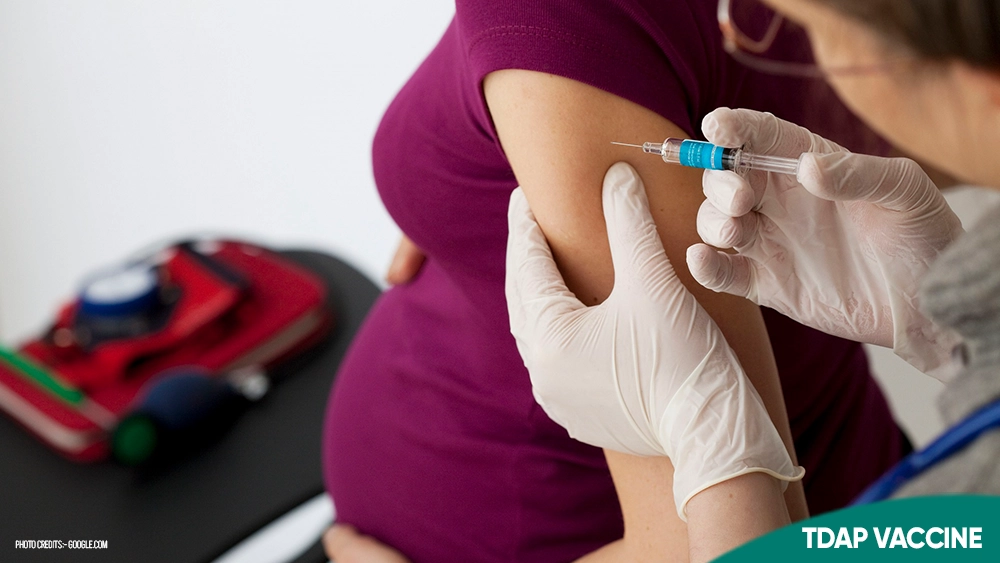
HEALTH BLOG
Tdap Vaccine While Pregnant: Protecting You and Your Baby
-
Rahul Priydarss
The Tdap vaccine while pregnant is essential for protecting both mother and baby from serious diseases like whooping cough, tetanus, and diphtheria. Administered between 27 and 36 weeks of pregnancy, the Tdap vaccine helps pass antibodies to the baby, offering early protection during their most vulnerable months. It is safe, effective, and recommended by healthcare professionals to prevent life-threatening infections, especially in newborns who are too young for vaccinations. This guide covers the importance, timing, and safety of the Tdap vaccine while pregnant, ensuring the best start for your baby’s health and well-being.
Introduction to Tdap Vaccine While Pregnant:
The Tdap vaccine is a crucial, safe, and highly recommended step during pregnancy to protect both you and your baby from tetanus, diphtheria, and pertussis (whooping cough). Getting vaccinated is vital in ensuring that your newborn has early protection against these potentially life-threatening illnesses. The Tdap vaccine is typically administered during the third trimester, between 27 and 36 weeks, and serves not only to protect the mother but also to pass protective antibodies to the baby before they are born. Since whooping cough can be particularly severe, even fatal, for newborns, the vaccine gives them a significant shield of defense until they are old enough to receive their own vaccinations.
In this guide, we’ll dive deep into what the Tdap vaccine is, its importance, the ideal timing, safety, benefits, and much more, all explained in a detailed yet easy-to-understand way. We’ll also answer common questions to provide you with a complete understanding of why getting the Tdap vaccine is a must for every pregnant woman.
What is the Tdap Vaccine:
The Tdap vaccine is a combination vaccine that protects against tetanus, diphtheria, and pertussis (whooping cough). Each of these diseases poses a significant risk, particularly for newborns who are too young to get their first round of vaccinations.
Tetanus causes painful muscle stiffness and lockjaw, making it hard for the body to function, including breathing and swallowing. While rare, it can be life-threatening without proper treatment.
Diphtheria is a bacterial infection that primarily impacts the airways and throat, causing difficulty breathing, and can result in complications such as heart and nerve damage.
Pertussis (Whooping Cough) is a highly contagious respiratory infection that leads to intense coughing fits. It is particularly dangerous for infants under two months old, as their airways are more delicate, and the illness can cause severe breathing problems, feeding difficulties, and even death in rare cases.
Receiving the Tdap vaccine during pregnancy allows mothers to pass protective antibodies to their baby, offering essential immunity in the first few months of life when the newborn is most vulnerable. These diseases can have severe consequences if not prevented, making vaccination a critical step.

Table of Contents
Why is the Tdap Vaccine Important During Pregnancy:
The Tdap vaccine is vital for several reasons, but most importantly, it provides both immediate and long-term benefits for your baby’s health. Pregnant women who get vaccinated during their third trimester provide essential antibodies to their baby, which protect them during those first fragile months when they are at risk for serious infections.
Whooping cough is particularly dangerous for newborns. Infants cannot receive their own vaccinations until they are at least two months old, leaving them vulnerable to the illness. Whooping cough can lead to severe coughing fits, making it difficult for a baby to breathe, eat, or sleep. In some cases, it can even lead to pneumonia, seizures, or death. The Tdap vaccine offers the only reliable protection for newborns until they are old enough to get vaccinated themselves.
On top of that, tetanus and diphtheria, while rare, are still present and can cause severe complications if contracted. The vaccine helps protect mothers from these infections, and in turn, safeguards the baby from contracting them after birth.
When Should You Get the Tdap Vaccine During Pregnancy:
The ideal time to get the Tdap vaccine during pregnancy is between 27 and 36 weeks. This timeframe ensures that your immune system has enough time to produce the antibodies that will be transferred to your baby through the placenta, giving them the best chance at protection after birth.
Vaccination in this period is crucial, as it aligns with the time when your baby’s immune system is still developing, allowing the antibodies to cross over efficiently. Once your baby is born, those antibodies provide immediate immunity against whooping cough, giving them protection during their most vulnerable months of life.
If for any reason you miss getting vaccinated during the recommended timeframe, it’s essential to consult your healthcare provider as soon as possible. You can still get vaccinated in the postpartum period, although the benefits of passing antibodies to the baby in utero will no longer be possible.
Is the Tdap Vaccine Safe for Pregnant Women:
Yes, the Tdap vaccine is completely safe for pregnant women and their babies. Extensive research has consistently shown that the vaccine poses no risk to the mother or child and does not cause any of the diseases it is designed to prevent. It is not a live vaccine, meaning it doesn’t contain live bacteria or viruses, so there’s no risk of infection.
The safety of the Tdap vaccine during pregnancy has been studied thoroughly, and no connection has been found between the vaccine and any negative pregnancy outcomes such as miscarriage, premature birth, or birth defects. Additionally, the CDC and many other health organizations strongly recommend it as a standard part of prenatal care due to its proven benefits in preventing dangerous diseases in newborns.
What are the Benefits of the Tdap Vaccine for Your Baby:
The biggest benefit of the Tdap vaccine during pregnancy is the transfer of protective antibodies to your baby. These antibodies provide immediate, passive immunity against pertussis (whooping cough), which is essential since newborns are not eligible to receive the vaccine until they are about two months old.
By receiving the Tdap vaccine, you ensure that your baby is born with some level of immunity to whooping cough, significantly reducing the likelihood that they will contract the disease in the early months of life. Studies have shown that babies born to mothers who were vaccinated during pregnancy are much less likely to contract whooping cough than those whose mothers did not receive the vaccine.
Additionally, the Tdap vaccine protects your baby from tetanus and diphtheria. Although these illnesses are less common today due to widespread vaccination, they can still occur and pose serious risks, especially to infants. Tetanus, for instance, can enter the body through even a small wound, and newborns with underdeveloped immune systems are particularly vulnerable.
Can You Get the Tdap Vaccine Postpartum:
Yes, if for some reason you didn’t get the Tdap vaccine during pregnancy, you can still get it immediately after giving birth. While getting vaccinated during pregnancy is ideal to ensure that your baby receives protective antibodies, getting the vaccine postpartum is still important to protect you and help reduce the risk of passing whooping cough to your baby.
If you get vaccinated postpartum, it’s a good idea to ensure that anyone else who will be in close contact with your baby is up to date on their own Tdap vaccination. This includes family members, caregivers, and other household members. By ensuring everyone is vaccinated, you help create a protective barrier, reducing the chances of your baby being exposed to whooping cough or other serious diseases.

Do You Need the Tdap Vaccine for Each Pregnancy:
Yes, you should receive the Tdap vaccine during every pregnancy, regardless of how recently you were vaccinated. This is because each pregnancy is unique, and the protective antibodies passed on to your baby only last for a short period of time. Even if you were vaccinated a year or two before, those antibodies may no longer be active, and your new baby will need the best protection possible.
Additionally, the amount of antibodies transferred to your baby depends on when you receive the vaccine during pregnancy. Receiving it during each pregnancy maximizes the protection for each child, ensuring that they are born with immunity to whooping cough, tetanus, and diphtheria.
What Are the Side Effects of the Tdap Vaccine:
While the Tdap vaccine is generally very safe, some people do experience mild side effects. These side effects are usually minor and go away on their own within a few days. Common side effects include:
- Soreness, redness, or swelling at the injection site
- Mild fever
- Headache or body aches
- Fatigue or feeling tired
In rare cases, some people may experience more severe side effects, such as an allergic reaction, but this is extremely uncommon. If you experience any unusual or severe symptoms, it’s important to contact your healthcare provider right away. They can help assess your situation and offer guidance on how to manage any discomfort.
Overall, the benefits of the Tdap vaccine far outweigh the risk of side effects, especially when considering the protection it provides to both mother and baby against life-threatening diseases.
Can Tdap Vaccine Prevent Whooping Cough in Newborns:
Yes, the Tdap vaccine is the most effective way to prevent whooping cough in newborns. By receiving the vaccine during pregnancy, your body produces antibodies that help protect your baby from the moment they are born. Whooping cough is highly contagious and can be devastating for young infants, causing violent coughing fits that make it hard to breathe, eat, or sleep.
In severe cases, whooping cough can lead to pneumonia, seizures, or even death in newborns. This is why the CDC and other health organizations recommend the Tdap vaccine as a standard part of prenatal care. Your baby’s immune system is not fully developed at birth, and receiving antibodies from the mother is the best way to give them a head start in fighting off these dangerous infections.
How to Discuss the Tdap Vaccine with Your Healthcare Provider:
If you have any questions or concerns about the Tdap vaccine, your healthcare provider is the best person to talk to. They can give you detailed information based on the latest research and answer any questions you may have about the vaccine’s safety, benefits, or timing.
It’s important to have an open conversation with your doctor or midwife, especially if you’ve had any previous vaccine-related concerns or allergic reactions. They can assess your personal health history and provide tailored advice on when and how to get vaccinated during your pregnancy.
FAQs about Tdap Vaccine While Pregnant:
A1: Yes, the Tdap vaccine is safe during pregnancy and is recommended by healthcare organizations worldwide. It helps protect both you and your baby from serious diseases like whooping cough, tetanus, and diphtheria.
A2: The Tdap vaccine is most effective when administered between 27 and 36 weeks of pregnancy. This allows enough time for your body to produce antibodies and pass them on to your baby.
A3: Yes, it’s recommended to get the Tdap vaccine with every pregnancy, even if you were vaccinated in a previous pregnancy. This ensures your baby receives the most protection.
A4: Yes, if you missed the Tdap vaccine during pregnancy, you can still get it postpartum. It helps protect you and reduces the chance of spreading whooping cough to your newborn.
A5: Common side effects include soreness at the injection site, mild fever, and fatigue. These symptoms usually go away on their own within a few days. Serious side effects are rare but should be reported to a healthcare provider.

-Please remember, to always consult with healthcare professionals or Doctors for personalised advice related to medical conditions.
Conclusion:
In conclusion, getting the Tdap vaccine while pregnant is a crucial step in ensuring both your health and your baby’s safety. This vaccine protects against whooping cough, tetanus, and diphtheria, providing your newborn with essential immunity during their first vulnerable months. By receiving the Tdap vaccine between 27 and 36 weeks of pregnancy, you help transfer protective antibodies to your baby. It is a safe and effective way to reduce the risk of serious infections, making it an important part of prenatal care. Always consult your healthcare provider for personalized guidance regarding the Tdap vaccine during pregnancy.




